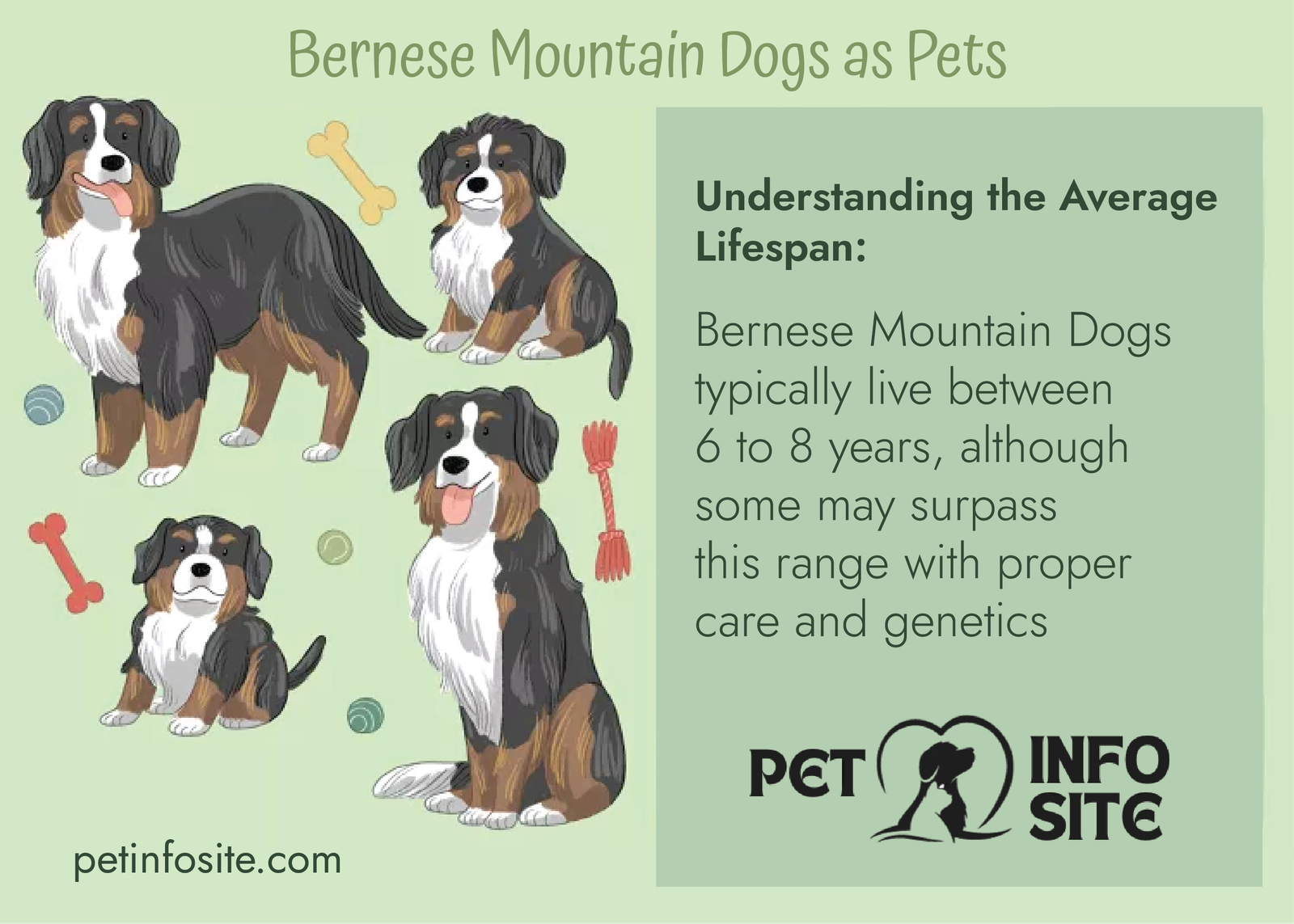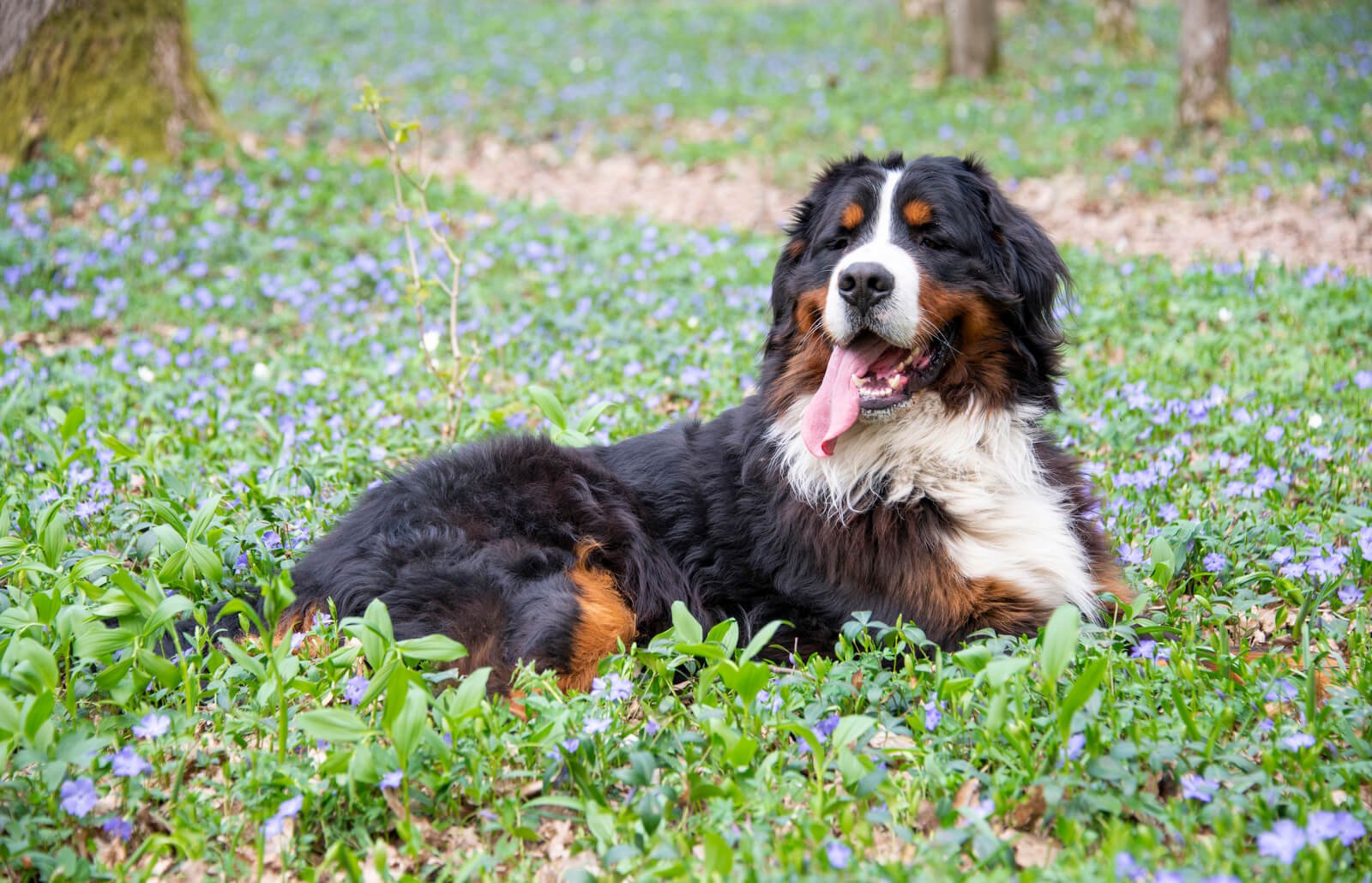Bernese Mountain Dog Life Expectancy
Bernese Mountain Dogs are known to have superb temperaments, awesome looks and dogs that are very loyal and obedient. While the new owners often doubt that, what they wish to know is the new companion’s life expectancy. In this guide, we demystify Bernese Mountain Dog’s life expectancy which empowers the new and existing Bernese Mountain Dog owners with important information and knowledge on how to get more quality years of their furry friends.
Bernese Mountain Dog Life Expectancy: A Detailed Overview
Understanding the Average Lifespan
Otherwise, it has a standard longevity of 6 to 8 years, yet, it might last longer in case it is well taken care of and/or has a genetic health prone disposition. As for the Bernese Mountain Dog’s life span, like any other breed, it depends on the genes inherited and lifestyle factors like food, exercise, and health checkups.
Factors Influencing Bernese Mountain Dog Life Expectancy
Here are some of the Bernese Mountain Dog factors affecting its life span.
Genetics:
These genetic diseases that are inherited have a very great effect on the lifespan of the affected genotypes.
Diet:
The role of a healthy diet in guaranteeing the balanced consumption of all sorts of nutrients is one of the fundamental prerequisites in any given society.
Exercise:
It is not just their bodies that get into shape but even their brain while exercising making Bernese Mountain Dogs’ expectancy longer.
Healthcare:
The main day to day preventive tools include regular checkups, immunization, and preventive health checkups to detect and treat diseases when they are still labeled as early diseases.
Tips for Prolonging Your Bernese Mountain Dog Life Expectancy
Below are some basic guidelines that you might need to follow if your Bernese Mountain Dog is to be hail and hearty.
Balanced Diet:
Reduce the intake of commercial dog food and go for the ones that are made specifically for big dogs. In addition, and again do not overfeed to avoid obesity and other related ailments that come with it.
Regular Exercise:
Play, walking and other comparable mental exercises should be done daily for the pet Bernese Mountain Dog as a form of exercise and play.
Veterinary Care:
Choose the appointment to check-ups and vaccinations and make your dog healthy and solve any issue with it that may occur immediately.
Grooming:
Bathing and trimming your dog during the breaks also keeps the animal beautiful apart from enhancing the well-being of its skin and the cover.
Safe Environment:
Eliminate risks that do not allow one to slide, fall or even get an injury within the area he or she is in.
Emotional Wellbeing:
Take time to shower your Bernese Mountain Dog with a lot of affection, play with him or her often, and spend quality time with him as this will help enhance his or her emotional health.
Health problems:
It may be conceived that the gene pool of the Bernese Mountain Dogs has certain inherited diseases that can affect the life expectancy of the breed unfavorably. Hip Dysplasia: An ailment widely affecting orthopedics, which leads to pain and results in movement limitation.
Cancer:
Unfortunately, the Bernese Mountain Dogs are prone to some kinds of cancer, and it may decrease their chances to live a long healthy life if these diseases are not diagnosed and treated at the first signs.
Bloat:
Also, it is known as gastric dilatation volvulus or simply gastric torsion, and the latter is considered the most severe and requires the immediate intervention of a veterinarian.
Heart Disease:
Out of these conditions affecting Bernese Mountain Dogs, hypertrophic cardiomyopathy would reduce their life span and quality of health.
Sincere owner, make sure the Bernese Mountain Dog, your pet, will lead a cheerful life all thanks to you. The challenges, if present, set aside, Bernese Mountain Dogs being a breed, can lead fulfilling lives provided the requisite amounts of care and love are provided to them. Looking after their medical needs and being sure they are comfortable is vital so that they can remain around for longer.
Conclusion
Knowledge about the Bernese Mountain Dog Life Expectancy may be viewed as an essential factor in providing your pets of this breed with the best possible care. Regarding nutrition, exercise, health care, and prevention, all of these will contribute to the Bernese Mountain Dog’s observing the quality of life quality it deserves. Check through to our blog to find out more information and stuff about every breed of dog.
Frequently Asked Questions (FAQs)
Generally, Bernese Mountian Dog Life Expectancy is 6 to 8 years, but every dog’s life depends on various factors.
Besides, feeding the dog a proper diet, other ways through which the dog’s rightful life expectancy can be extended include taking it for walks, taking it for vet services, grooming it, and providing safety as well as emotional support.
It likewise included Hip dysplasia, cancer, bloat, and heart disease some of the diseases common to many people. Vet accesses are an important predictor in the timely check-ups and treatment processes.
Therefore, on the same note genes do not solely dictate an individual’s health, if proper care, a healthy diet and the practice of preventive measures can be the decisive means to reduce a certain health risk.
It is recommended that the dog should be taken to the vet for check-up two times a year though this could differ depending on the health state of the particular dog.
Choose a premium dog food formulated for large breed dogs and you may either consult or do your research about the diet your dog needs.







